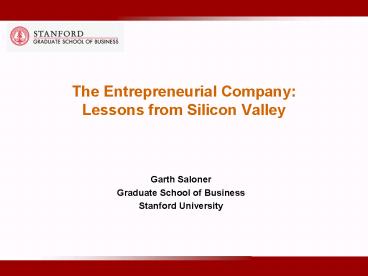The Entrepreneurial Company: Lessons from Silicon Valley - PowerPoint PPT Presentation
1 / 14
Title:
The Entrepreneurial Company: Lessons from Silicon Valley
Description:
Some Pros and Cons of VC Funding. Pros: Money now and deep pockets. Credibility ... Cons: Dilution. Control/influence. Exit pressure. Timing and Rounds ... – PowerPoint PPT presentation
Number of Views:21
Avg rating:3.0/5.0
Title: The Entrepreneurial Company: Lessons from Silicon Valley
1
The Entrepreneurial Company Lessons from Silicon
Valley
- Garth Saloner
- Graduate School of Business
- Stanford University
2
Myth New Venture Ideas Come Out of the Blue
- It is a myth that getting an idea for a new
venture is like getting struck by lightning - More often than not grow out of experience.
Experience is a source of ideas and lens for
evaluation - Entrepreneurial ideas can be searched for
- FiberTower
- EIRs
3
Myth There is a Particular Entrepreneurial
Type
- Decades of research has failed to identify
personal traits - Some research suggests generalists are more
likely to become entrepreneurs than specialists - Risk aversion is not a good predictor and not a
good metric since risk can often be controlled - Some observers suggest integrity, intelligence,
judgment, creativity, and passion. - There is more commonality to the process of
entrepreneurship than to the entrepreneurs
themselves
4
Myth Vision is Only For Leaders of Large
Companies
- Vision is critically important in start-ups
- A coherent vision is required to sell to sources
of capital, prospective and current employees,
customers and strategic partners - But also need a compelling business model and an
associated financial model that derive from the
vision and that make sense - A good business plan is the manifestation of the
test of the underlying assumptions
5
Myth Start-Ups Move too Rapidly to have Strategy
- Strategy defined as objectives, scope,
competitive advantage, and logic - Because start-ups learn at a much faster rate
than established firms, strategy changes more
often - Strategy process is typically more flexible
strategy often exists as a Powerpoint
presentation - There is a tension between focus and
experimentation - Strategy process is much simpler and certainly
more top-down than in most established companies
6
Myth Most Silicon Valley Start-Ups are Venture
Capital Funded
- Friends and family
- Angels
- High net-worth individuals
- Venture capitalists
- Strategic investors
7
Recent History and Current State of Venture
Capital in US
- The bubble years
- Large funds and overhang has become an
investment category - Hierarchy
- Gun-shy about new investments 2001-2003
- 2004-2005 Return to normalcy
- 2006/7 Return to multiple term sheets,
valuations rising.
8
The Venture Firm Model
- GPs and LPs
- Management fee and carry
- Lone ranger vs. team models
- Time and money
- Fund success driven by big wins
9
VC Return Profile
10
Profile of a successful venture-funded firm
11
Some Pros and Cons of VC Funding
- Pros
- Money now and deep pockets
- Credibility
- Help in building out the business
- Help in finding customers/strategic partners
- Cons
- Dilution
- Control/influence
- Exit pressure
12
Timing and Rounds
- Financing is usually done in rounds to balance
- amount of money at disposal
- valuation
- and cost of raising money
- The typical path has a seed round from friends
and family, perhaps a round of angel financing,
and then several rounds of venture financing - Many start-ups believe in overfunding when they
can (eat while dinner is being served)
13
Myth Organization Design is a Big Company Issue
- Do entrepreneurs worry about setting culture
early on or later? - Difficult to change
- Clarity of vision and culture may induce
self-selection - The Silicon Valley culture mobility, failure
forgiveness, networks, sweat equity. - Most successful start-ups are forced to confront
the issue of whether the founding management team
can scale - The skill sets that are valuable in the start-up
stage are often not valuable in the growth phase
14
Some Lessons From Successful New Ventures
- They are scrappy
- They hire ahead of the curve
- They use their Board, Advisory Board, strategic
partners to look larger than they are - They define culture early and use it as a
self-selection tool - They are agile and change strategy as needed
- They get lots of market feedback and adjust
- They are honest about their prospects (good and
bad)













![8 Things Entrepreneurs Do Differently [Huff Post] PowerPoint PPT Presentation](https://s3.amazonaws.com/images.powershow.com/8739328.th0.jpg?_=20190329016)

















